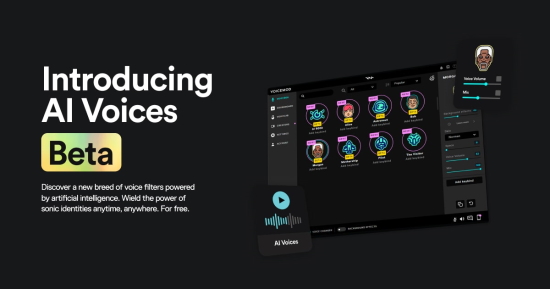[The Verge reports on Voicemod’s use of artificial intelligence to create more convincing real-time transformations of anyone’s voice, which illustrates again the promise and peril of presence-evoking technology; as Futurism’s coverage notes:
“Being able to completely change our voice, however, comes with a much darker side as well, not unlike the use of deepfakes. For instance, cloned voices could be used to commit fraud or bully others. …
Bottom line? It’s no longer just faces that can be turned into the likeness of celebrities. In fact, we’re already living in a future in which both our faces and voices can be transformed simultaneously on the fly — a terrifying or fascinating reality, depending on how you look at it.”
–Matthew]

Voicemod uses AI to transform your voice into Morgan Freeman, astronauts, and more
AI voices enters beta today
By Tom Warren
June 15, 2022
Voicemod, a popular real-time voice changer, is starting to use artificial intelligence to transform your voice into Morgan Freeman and other characters. A new Voicemod AI Voices beta is launching today, offering up eight options to transform your voice into fantasy characters, pilots, astronauts, and the actor Morgan Freeman.
Voicemod has been transforming voices for years thanks to classic sound design techniques, but these new voice effects combine AI, too. The “Morgan” voice, as Voicemod calls it, is particularly impressive, allowing you to pretend to be the famous movie star or simply a polished voice actor. The new pilot voice is also a lot of fun, with sound effects that really make it sound like you’re piloting an aircraft.
All of the voices are processed in real time, so they’re ideal for streaming on Twitch or for fun calls on Discord. All the data for these voices has been generated with the help of English-speaking professional voice actors with characteristics that match the voice that Voicemod is recreating. Actors read scripts to generate data for AI-based models, and then sound designers use traditional sound design techniques to turn the voices into fully-fledged characters. Many of the AI voices include dynamic effects, filters, and background music.
As these AI voices are processed on your own PC, they will require more CPU power than regular Voicemod effects. Voicemod is opening up a beta today (you can sign up here), and you’ll be able to test them on your PC to make sure there aren’t any audio dropouts or other performance issues. The main version of Voicemod is only available on PC right now (a mobile app exists), but a Mac version is on the way.
Realistic synthetic voices are getting ever more impressive as the years roll by. While AI voices have been a novelty in the past, tools like Resemble.AI and Respeecher have demonstrated the potential for content creators, letting editors use voice clones to edit spoken word recordings. Voicemod’s AI voices are now targeted at steamers and content creators, and they’re part of a wave of progress that shows just how close we are to everyone being able to clone voices freely.
Voicemod also launched its PowerPitch technology recently, allowing users to create a persistent online voice identity for gaming and role play, work, school, or just regular calls. This technology can easily be used for fun and pranks, but it can also benefit the millions of people with voice disorders to improve problems with pitch, loudness, and quality. It also benefits some trans gamers. AI isn’t being applied to PowerPitch just yet, but it seems it’s only a matter of time before you’ll be able to have your own AI voice you can use for meetings, Discord calls, or anything else.
|